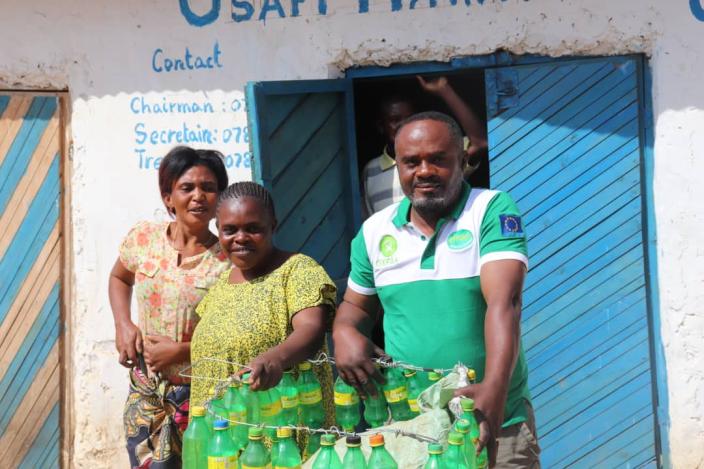The Usafi Nakivale group in Nakivale Refugee Settlement is composed of refugees from Congo, Burundi, Rwanda, Somalia, and some Ugandan nationals. It was formed in 2017 by Mirindi Murhega, a 46 year old Congolese refugee of Nakivale Settlement. On the first look, one can tell that he is a respected figure among the youth as he is addressed as chairman and occasionally consulted on one or two things here and there in the course of meeting him.
Mirindi mobilized over 800 youth and conducted a community meeting to discuss the rising health concerns within the settlement which had become unbearable and visibly disturbing. ‘’Our health center was always filled to capacity and some people would wait for hours in long lines to get treatment,’’ explained Mirindi.
‘’We also realized that people contaminated their water due to their vicinity and exposure to waste hence getting sick,’’ added Julles Mirindi a member of the group.
During the meeting, they decided to start picking rubbish and waste from the streets and households to try and instill some semblance of hygiene within their communities. The Office of the Prime Minister provided the group with a dumping site to aid in their quest to manage waste within the settlement. In 2019, the United Nations High Commissioner for Refugees (UNHCR) supported the group with equipment including wheelbarrows, spades, pangas, slashers, gumboots and gloves. This boosted the group’s morale to continue collecting waste from 4 zones in the refugee settlement. Despite the group’s efforts however, communities remained littered with waste.
‘’We noticed that the more we collected rubbish, the more the refugees continued to openly dispose of rubbish on the roadsides, including plastics,’’ observed Christian Lenge, a member of the Usafi Nakivale group.
In February 2022, Oxfam proposed that the group reuses the plastics they collect instead of dumping, to protect the environment. The group welcomed the idea and received training from Oxfam on how to manage waste. The training covered separating plastic from other wastes, and re-using the plastic to make other materials including dustbins in order to save and conserve the environment.
After the training, Oxfam provided the group with equipment needed to make the plastic dustbins including wires, card boards, and holding tools (magaro) . The group began collecting plastics from designated places like shops, events, offices, and other places within the refugee settlement to make plastic dustbins. They have so far made 10 dustbins and freely distributed them in strategic places within the settlement for refugees to throw in their rubbish.
The Usafi Nakivale group currently has 107 members who come together every Monday and Friday to collect rubbish from the settlement, separate plastics and use it to make dustbins. They also provide cleaning services to restaurants, shops and events, to enable them earn income as a group. They equally formed a savings group where they save some money and support each other when members are faced with financial challenges.
The group plans to plant trees to protect the environment and to reuse non plastic waste for biogas production. However, they are still constrained by limited finances.
